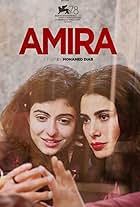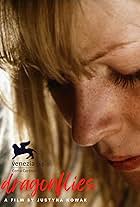Advanced search
- TITLES
- NAMES
- COLLABORATIONS
Search filters
Enter full date
to
or just enter yyyy, or yyyy-mm below
to
to
to
Exclude
Only includes titles with the selected topics
to
In minutes
to
1-50 of 52
- With the aid of a fellow Auschwitz survivor and a hand-written letter, an elderly man with dementia goes in search of the person he believes to be responsible for the death of his family in the death camp to kill him himself.
- In southern France, a Franco-Arabic shipyard worker along with his partner's daughter pursues his dream of opening a restaurant.
- Two Italians looking for work and happiness abroad.
- Framed round a candid conversation between the photographer Brigitte Lacombe and the film maker discussing their process and fascination with images as well as Brigitte's close relationship to her sister Marian Lacombe (whom she works and travels with). Lynne sets up and films a real time photo shoot for Brigitte, selecting a "cast" for her to photograph with a theme of sisters and creative siblings, allowing us to closely observe the photographer at work. A cast of some true relations, close friend's considered sisters and "siblings" with modern re-definitions of family not connected by blood. An insight into Brigitte's creative process, her obsession with taking pictures and how her lens defines her relationship with her subjects and the world.
- The lives of several Varsovians are intertwined for just 11 minutes. These minutes turn out to be crucial for their ultimate fate.
- Women's expressions are captured as they watch Khosrow and Shirin, a 12th-century Persian play staged by Kiarostami, revealing their reactions to the unseen narrative.
- Massimo is a dentist from Latina, happily married with two daughters. One day he goes down to the cellar for housework and finds a girl tied up and gagged, asking for help.
- The film is a historical and socio-anthropological portrait of the provincial capital of Campania, Naples, and the organised crime that afflicts it, and is the fruit of months of rummaging through the treasures of Rai Teche, the archives of the Italian state broadcaster. Surprising vintage footage, most of it never shown before, finds a visceral connection with the original music and songs written by Meg. Camorra delves into the soul of an inscrutable city. The film clips tell the story of the growth of the crime syndicate between the 1960s and 1990s: from its subordination to the Mafia, which controlled the contraband of cigarettes in Campania after the war, until the advent of Raffaele Cutolo, who unified the bands of extortionists into a single, large armed and economic power.
- Lila and Mo meet at a bus stop. Lila has a paralyzing speech impediment. Mo is chatty, exuberant. Lila is preparing for her exams. Mo illegally races cars for a living. Opposites attract, they fall in love. But Mo carries a secret burden.
- A Palestinian girl's world is turned upside down when she learns the man she grew up idolizing is not her real father.
- Two families, one bourgeois and intellectual and the other proletarian and fascist, are brought together by a trivial accident that will bring these two polar-opposites together and set them on a collision course.
- Under the sun, the heavenly beauty of grasslands will soon be covered by the raging dust of mines. Facing the ashes and noises caused by heavy mining , the herdsmen have no choice but to leave as the meadow areas dwindle. In the moonlight, iron mines are brightly lit throughout the night. Workers who operate the drilling machines must stay awake. The fight is tortuous, against the machine and against themselves. Meanwhile, coal miners are busy filling trucks with coals. Wearing a coal-dust mask, they become ghostlike creatures. An endless line of trucks will transport all the coals and iron ores to the iron works. There traps another crowd of souls, being baked in hell. In the hospital, time hangs heavy on miners' hands. After decades of breathing coal dust, death is just around the corner. They are living the reality of purgatory, but there will be no paradise.
- Yusuff has a hard time defining his adulthood. In one hand, there are his mother's expectations while on the other hand his passions.
- The Ethiopian intellectual Anberber returns to his native country during the repressive totalitarian regime of Haile Mariam Mengistu and the recognition of his own displacement and powerlessness at the dissolution of his people's humanity and social values. After several years spent studying medicine in Germany, he finds the country of his youth replaced by turmoil. His dream of using his craft to improve the health of Ethiopians is squashed by a military junta that uses scientists for its own political ends. Seeking the comfort of his countryside home, Anberber finds no refuge from violence. The solace that the memories of his youth provide is quickly replaced by the competing forces of military and rebelling factions. Anberber needs to decide whether he wants to bear the strain or piece together a life from the fragments that lie around him.
- Jack has always wanted a little brother to play with, and when Gio is born, his parents tell him his brother is a "special" child. That's when Gio turns into a superhero with amazing powers in his big brother's imagination, like the ones in his comic books. Over time, however, Jack learns the truth: his brother has Down syndrome, a condition Jack decides to keep secret. When he goes to high school and falls in love with Arianna, he hides Gio's very existence from her and his new friends. But how can you expect someone to love you if you conceal such an important part of yourself? In no time, the truth comes out, and Jack realizes that Gio's energy and vitality are contagious. Gio's original outlook does indeed change the world, just like a superhero.
- When Naomi, a fine, young sexy thing from South Central L.A., is invited to Palm Springs by her rich Uncle Bob to house sit for the weekend, she recruits three of her best friends to join her for the weekend for a Slumber Party.
- Farah, a bread seller, walks the streets of a Middle Eastern town, while an American military vehicle, surrounded by soldiers, slowly passes by. A moment's silence. Then, a devastating explosion. Civilians are bloodied, wounded. The horrors of war. "Farah" looks around aghast and wailing. But nothing here is quite what it seems. In fact, "Farah" is a character played by an aspiring actress called Laila. And this isn't Iraq, but a replica village erected on the Fort Irwin army base in California, used to train American troops before being sent abroad. Laila believes her acting talents are being wasted away in this arid simulation, where female role-players are limited to mute, background roles. She takes things much more seriously. Laila plots her way out.
- In a middle school on the northern outskirts of Naples, a teenager roughly fifteen years old appears before the examiners to earn his diploma. The professors are as skeptical as can be expected about a student who has repeated the year more than once, but the boy isn't intimidated and delivers his oral report about history, his own personal history, marred by a tragedy, and then moves on to discuss the human body and the sculpture The Veiled Christ. The teachers hear him out in silence; a passing grade is all he asks for. The film was conceived and produced as part of a film production course at Vodisca Teatro / La Scugnizzeria held by Gianluca Arcopinto and Vincenzo Marra.
- The "Great Sichuan Earthquake" took place at 14:28 on May 12, 2008. 10 days after: Scenes not seen on official/TV, "survival" is the keyword. Ordinary people are salvaging destroyed pig farms in the mountains, recuperating cents-worth scrapped metals, or pillaging victims' homes. Behind the highly-mediatized official visits, inconsolable grief of families searching for loved ones. Throughout, a vagabond in tattered clothes wanders among the ruins, observing tragic scenes. A monk and a Taoist visionary suggest: "the earthquake is the consequence of Earth-Gods no longer worshipped." 210 days after: Harsh winter, villagers preparing for Lunar New Year, the vagabond and family are detailing grievances about the ill-handling of rebuilding schemes and relief funds. Gearing up for a high official's visit, comes a thorough clean-up of the villages and tent-resettlement for refugees. Promise made for all to live in houses in winter seems tough to keep. Fake parts in the community transformer brought electricity blackout for New Year's Eve reunion dinners. New Year Day starts as never-ending parade of tourists buying DVDs of the most horrific scenes, souvenir albums of corpses being pulled out of the ruins, and photos taken in front of Beichuan, the town most severely hit, where over 70,000 people perished in seconds.
- An evil Nazi, a boy's vivid imagination and his comic book drawings take you on a journey into a world where his fantasy becomes reality at the most inappropriate and dangerous time. Being 12, a talented comic book artist, having a mind of his own, his first crush, the fearlessness that comes with youth and being Jewish in Nazi Germany was Walter's life. Inspired by actual events a combination of live action and animation(based on Jaeden Lieberher's drawings) makes for a thrilling and entertaining tale.
- In 1961, a Soviet medical officer is conflicted about his position overseeing the health of future cosmonauts.
- Several young daughters of rich industrialists examine in an equally intangible and compelling way the physical and spiritual aspects of a cultural recession.
- A nondescript, law-abiding individual - a real "gray man" - goes out one morning to buy fish at the market, but crosses paths with an excitable mob of people he doesn't know. They think he's a thief and chase him down the street, until he shakes them off by hiding in a basement. A nasty and none too bright cop finds him there, roughs him up and searches him. Once he realizes he's innocent, the cop leaves, after ordering him not to move from the spot till he returns. The nondescript former suspect obeys the policeman to the letter, and waits for days, hands up, not moving a muscle, for his Messiah to come back for him.
- Seemingly blissful, placed in seaside landscapes, story of infatuation with a local skirt chaser and a narcissus - Kuba, who's numerous mischiefs border with teenage psychopathy. - Venice Film Festival
- Workers, peasants, soldiers, students and merchants were five groups of Chinese society in the 1950s, after the so-called elimination of the exploited class. Borrowing this concept, the umbrella is taken as the clue to rediscover changes in various social classes after the economic reform, and to analyze the social problems in China. Workers making umbrellas, merchants selling umbrellas, students looking for jobs in the rain. Umbrella is used as a metaphor that can be seen everywhere. As the raindrop, what we see is sometimes clear, sometimes untraceable.
























